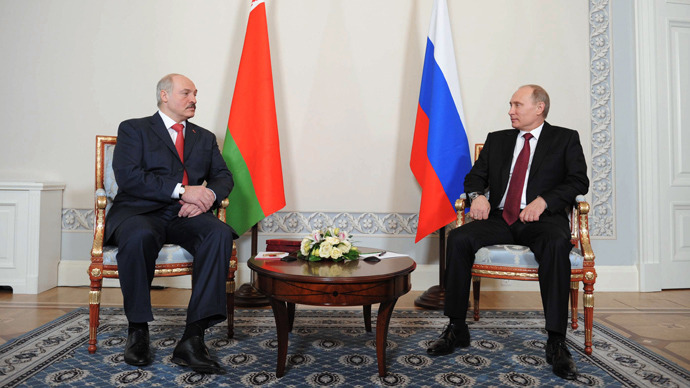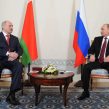
Belarus Continues Its Drift Toward Russia while Moving up in Human Development Rank
Publication: Eurasia Daily Monitor Volume: 10 Issue: 53
By:

On March 17, accompanied by an 80-member delegation, including many directors of state-run companies, Belarusian President Alyaksandr Lukashenka left for a seven-day visit to Indonesia and Singapore (https://www.svaboda.org/content/article/24931615.html). On March 18, he reported signing export contracts worth $400 million in Jakarta (https://www.gazetaby.com/cont/art.php?sn_nid=54868).
Two days prior to this faraway trip, Lukashenka met with Vladimir Putin in Saint Petersburg at a session of the Supreme Council of the Russia-Belarus Union State. The highlights of the meeting include a push to speed up the formation of Russian-Belarusian joint stock companies (JSC), Belarus’s request for a $2 billion loan from Russia for technological modernization, and Lukashenka’s interview on the TV channel Russia Today (RT). Among the JSCs to be created is Rosbelauto, which will combine the assets of two truck factories, the Minsk-based MAZ and the Tatarstan-based KAMAZ. Lukashenka has long resisted the merger of MAZ and KAMAZ. But in Saint Petersburg it was decided that the management scheme of this new JSC will have to be confirmed by April 15. Other joint company ventures will combine the assets of the Minsk-based Integral, a flagship electronics firm, as well as Rossiiskaya Electronica; the Russian Roskosmos and the Minsk-based Peleng, a designer and producer of optical equipment; and the Russian Eurokhim (a chemical enterprise) with the Grodno-based Azot (nitrogen) plant. Also, the Belarusian Wheeled Tractor Plant will be formally incorporated into the Russian military industrial complex. According to Valentin Alesin, an analyst for the Belarusy i Rynok newspaper, Russia is going to apply pressure to force the best Belarusian production units into tight cooperation agreements with their Russian counterparts, but Moscow will exercise caution in doing so. Caution is motivated by the necessity to avoid scaring away other potential integration partners, notably Ukraine (https://naviny.by/rubrics/economic/2013/03/17/ic_articles_113_181156/print/). This opinion is seconded by Victor Dyatlikovich, an analyst from the Russian journal Russikii Reporter, who is even more adamant about Ukraine being the true target of Vladimir Putin’s economic reintegration effort (https://www.svaboda.org/content/article/24932326.html). At the same time, speeding up integration with Belarus appears to be a precondition for Russia’s decision to lend Belarus $2 billion for the modernization of its industries.
In his interview on RT, Lukashenka observed that of the Latin American leaders he had a chance to meet at Hugo Chavez’s funeral, most are left-wing politicians who are furthering the causes of “freedom, independence and justice.” The Belarusian president said he would never consider transferring power to any of his children, noting that his successor would need to win the elections just as Lukashenka himself did in 1994 and thereafter. Lukashenka averred that his main achievement boils down to two decades of independence. “We created all the trappings of this state except the border with the Russian Federation. But we do not need that border yet as Russia does not claim our land and we do not claim theirs.” Lukashenka also acknowledged that he is worried about the possibility of reckless and rampant privatization after his eventual retirement. Twice during the interview he acknowledged his authoritarian style of governance, but remarked that “to be a dictator, like our great grandfather [Joseph] Stalin, one has to possess the resources,” which he (Lukashenka) lacks. “I do not hug nuclear warheads in my sleep, and I do not have as much oil as Chavez did nor as much natural gas as Russia has,” he conceded. Lukashenka opined that a new crop of competitive political leaders has yet to appear in Belarus because the existing leader, “pardon [Lukashenka’s] immodesty,” is still strong enough. Nevertheless, popular political competitors will appear in due course (https://news.tut.by/politics/339468_print.html).
Interestingly, in the course of the interview, Lukashenka commended the United States for supporting the 2009 $3.46 billion stabilization loan by the International Monetary Fund (IMF) to Belarus. “Without them [the US], the IMF would have never granted us [Belarus] that loan,” he contended. A new IMF mission is working in Minsk from March 14 to 25, but most observers do not believe the IMF will agree to issue a new loan at this point (https://naviny.by/rubrics/politic/2013/03/19/ic_articles_112_181180/print/).
Amid the country’s economic troubles, Belarusian analysts continue to mull over the political implications of a two-month-old discovery, according to which a major change occurred in the relationship between the dynamics of Belarusians’ personal incomes and Lukashenka’s popularity rating. Until 2012, these two variables were closely correlated, and in 2011 both reached a nadir. Yet, a significant rise in average incomes from the lowest point associated with the 2011 financial crisis has not resulted in a proportional rise in Lukashenka’s rating (see EDM, January 10). It now appears from the analysis by Dr. Yury Drakakhrust, a mathematician and an associate at Radio Liberty, that the aforementioned conclusion was drawn from a flawed comparison. Namely, wage growth/decline rates were compared against the absolute level of popularity and trust—expressed as the percentage of respondents who trusted or were ready to vote for Lukashenka. However, by switching to truly comparable data, that is, to growth/decline rates in both cases—average wages and Lukashenka’s rating—it appears that a close correlation between these variables has not disappeared by any means. A sharp decline in wages 11 years ago, in 2002, triggered a commensurate decline in Lukashenka’s rating only to give way to their concurrent rise by 2004. A similarly concurrent decline and growth of wages and of Lukashenka’s rating occurred from 2011 to 2013. Developments in both 2002 and in 2011 begot hopes of an imminent change in leadership. “But the illusions are a bad foundation for the realization of those hopes,” concludes the author of this new corrective analysis (https://nmnby.eu/news/analytics/5110.html).
Indeed, developmental conditions in the country have actually shown a dramatic improvement in the lives of Belarusians over the last couple years. According to the United Nations Development Program’s (UNDP) most recent Human Development Report, Belarus has jumped from 65th position in the ranking order of 187 countries on the Human Development Index (HDI) in 2011, to 50th place in 2013 (https://hdr.undp.org/en/reports/). The HDI is calculated on the basis of four indicators—life expectancy at birth, mean years of schooling, expected years of schooling and gross national income per capita (https://hdr.undp.org/en/statistics/hdi/; https://naviny.by/rubrics/society/2013/03/16/ic_articles_116_181153/print/). On this reputable development index, Belarus is ahead of all the post-Soviet countries except the Baltic States. Belarusians most frequently compare their country with Russia, which is 55th, and with Ukraine, which is 78th on the HDI (https://hdr.undp.org/en/statistics/). Consequently, in the face of these encouraging trends, Belarus appears to be increasingly falling under the sway of a less developed economy—Russia. To escape such an inescapable dependency, however, Minsk will need to pursue a multi-vector international economic policy that successfully engages all of its neighbors.




